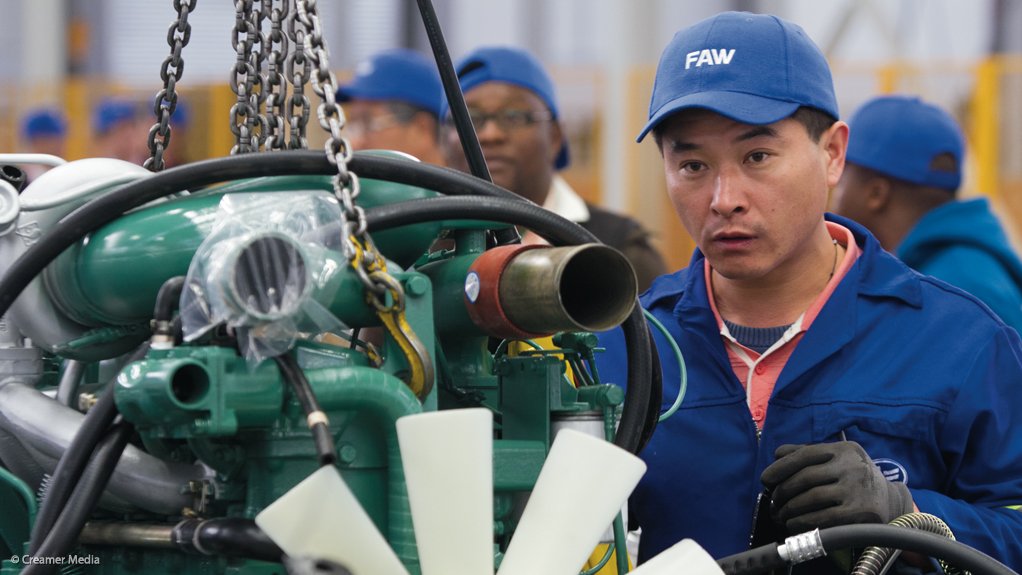Declines in manufacturing demand, activity narrows in Feb – PMI
The seasonally adjusted Kagiso Purchasing Managers’ Index (PMI) fell by a steeper-than-expected 6.6 index points to 47.6 in February, driven chiefly by a 16.2-point decline in the business activity index (BAI) to 45.5.
While January’s figure was “artificially high”, owing to seasonal factors, Kagiso Asset Management research head Abdul Davids advised on Monday that the group had not expected such a dramatic decline in the February index.
“The BAI has been very volatile since October, swinging by an average of 10.8 points from month-to-month. This reflects the uncertainty and volatility of the underlying environment, as the timing and frequency of load shedding is unstable.
“This will remain a key constraint in the manufacturing sector, as interruptions in electricity supply affect manufacturers’ ability to produce and directly dampens domestic demand,” he commented.
The new sales orders index fell by 4.4 points to 49.3 in February, driven, most likely, by domestic factors, as the global manufacturing picture had improved during the month.
The employment index slumped further to 43 points.
While the inventories index declined from its “exceptionally” high level of 61.2 in January to 53.3 in February, it remained in positive territory.
The price index, meanwhile, continued to signal a slowdown in the rate of increases in input costs, dropping almost 30 points year-on-year to 60.4 in February.
However, Davids cautioned that the price index – as well as actual producer price inflation – could bounce back in coming months.
“The oil price picked up during February and this, coupled with a weaker rand exchange rate, means that petrol and diesel prices will rise by 96c/l and 74c/l respectively on Wednesday.
“A further increase is expected in April on the back of the higher fuel levy and the increase in the contribution to the Road Accident Fund. In addition, electricity prices will rise in the coming months, which suggests that input cost pressures could intensify for manufacturers going forward,” he noted.
Despite the current setbacks, purchasing managers remained surprisingly optimistic about the future, as the index measuring expected business conditions in six months’ time fell to “only” 64.4 from 66.9 index points.
Despite the fall in new sales orders, the PMI leading indicator nudged up.
“However, the indicator remained below one point, which suggests that a quick output recovery is unlikely,” Davids cautioned.
Banking group BNP Paribas economist Jeffrey Schultz added that, while the deterioration in the manufacturing PMI index in February could be partly attributed to some “normalisation” following January’s seasonal adjustment issues, the larger-than-expected drop in the business activity and new sales orders subindices remained concerning.
“Both global and domestic demand conditions remain trying, which, along with ongoing concerns related to the future security of electricity supply for large industry, will most likely keep this index hovering around broadly neutral territory for at least the first half of the year,” he said.
Steel and Engineering Industries Federation of Southern Africa (Seifsa) chief economist Henk Langenhoven said it was “deeply concerning” that several subindices that indicate future demand were declining in unison.
This substantiated the industry body’s views that the accumulation of uncertainties was “seriously weighing down” on the metals and engineering sector in particular and on manufacturing in general.
“These PMI indicators are short-term warnings that tough times over the medium-term are becoming more probable. Seifsa has been warning that the sector experienced capacity under-utilisation, low recorded profit margins and very tough domestic and international market conditions,” stated Langenhoven.
He reiterated that the intermittent electricity supply was causing serious harm to the sector’s production capabilities.
Comments
Press Office
Announcements
What's On
Subscribe to improve your user experience...
Option 1 (equivalent of R125 a month):
Receive a weekly copy of Creamer Media's Engineering News & Mining Weekly magazine
(print copy for those in South Africa and e-magazine for those outside of South Africa)
Receive daily email newsletters
Access to full search results
Access archive of magazine back copies
Access to Projects in Progress
Access to ONE Research Report of your choice in PDF format
Option 2 (equivalent of R375 a month):
All benefits from Option 1
PLUS
Access to Creamer Media's Research Channel Africa for ALL Research Reports, in PDF format, on various industrial and mining sectors
including Electricity; Water; Energy Transition; Hydrogen; Roads, Rail and Ports; Coal; Gold; Platinum; Battery Metals; etc.
Already a subscriber?
Forgotten your password?
Receive weekly copy of Creamer Media's Engineering News & Mining Weekly magazine (print copy for those in South Africa and e-magazine for those outside of South Africa)
➕
Recieve daily email newsletters
➕
Access to full search results
➕
Access archive of magazine back copies
➕
Access to Projects in Progress
➕
Access to ONE Research Report of your choice in PDF format
RESEARCH CHANNEL AFRICA
R4500 (equivalent of R375 a month)
SUBSCRIBEAll benefits from Option 1
➕
Access to Creamer Media's Research Channel Africa for ALL Research Reports on various industrial and mining sectors, in PDF format, including on:
Electricity
➕
Water
➕
Energy Transition
➕
Hydrogen
➕
Roads, Rail and Ports
➕
Coal
➕
Gold
➕
Platinum
➕
Battery Metals
➕
etc.
Receive all benefits from Option 1 or Option 2 delivered to numerous people at your company
➕
Multiple User names and Passwords for simultaneous log-ins
➕
Intranet integration access to all in your organisation




















